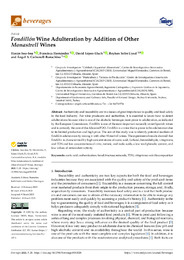Please use this identifier to cite or link to this item:
https://hdl.handle.net/11000/32373
Fondillón Wine Adulteration by Addition of Other Monastrell Wines
Title:
Fondillón Wine Adulteration by Addition of Other Monastrell Wines |
Authors:
Issa Issa, Hanán
Hernández, Francisca
López Lluch, David 
Uysal Afacan, Reyhan Selin 
Carbonell-Barrachina, Ángel A. |
Editor:
MDPI |
Department:
Departamentos de la UMH::Producción Vegetal y Microbiología |
Issue Date:
2023-03-20 |
URI:
https://hdl.handle.net/11000/32373 |
Abstract:
Authenticity and traceability are two issues of great importance to quality and food safety in the food industry. For wine producers and authorities, it is essential to know how to detect adulterations because wine is one of the alcoholic beverages most prone to adulteration, as indicated by the European Commission. Fondillón is one of the most important naturally sweet Spanish wines and is certainly the core of the Alicante PDO. Fondillón is a wine that is prone to be adulteration due to its limited production and high price. The aim of this study was to identify potential markers of Fondillón adulteration by mixing it with other Monastrell wines. The experimental results showed that Fondillón is characterized by high concentrations of acetic acid, furfural, benzaldehyde, vitispirane, and TDN and low concentrations of citric, tartaric, and malic acids; a low total phenolic content; and low values of antioxidant activity
|
Keywords/Subjects:
Acetic acid
Authentication
Fraud
Fructose
Minerals
TDN
Vitispirane
Volatile composition |
Knowledge area:
CDU: Ciencias aplicadas: Agricultura. Silvicultura. Zootecnia. Caza. Pesca: Horticultura. Viticultura |
Type of document:
info:eu-repo/semantics/article |
Access rights:
info:eu-repo/semantics/openAccess |
DOI:
https://doi.org/10.3390/beverages9010028 |
Published in:
Beverages 2023, 9(1), 28 |
Appears in Collections:
Artículos - Producción vegetal y microbiología
|
 ???jsp.display-item.text9???
???jsp.display-item.text9???

.png)
